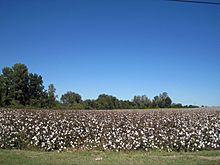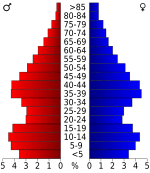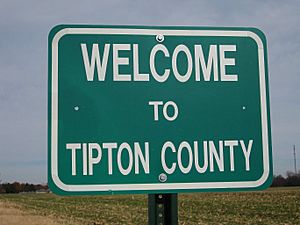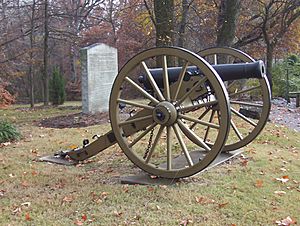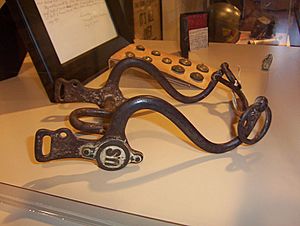Tipton County, Tennessee facts for kids
Quick facts for kids
Tipton County
|
|
|---|---|
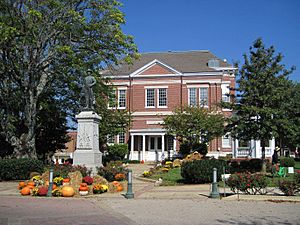
Tipton County courthouse in Covington, Tennessee
|
|

Location within the U.S. state of Tennessee
|
|
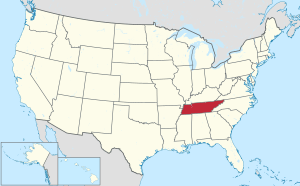 Tennessee's location within the U.S. |
|
| Country | |
| State | |
| Founded | October 29, 1823 |
| Named for | Jacob Tipton, 18th-century soldier |
| Seat | Covington |
| Largest city | Atoka |
| Area | |
| • Total | 473 sq mi (1,230 km2) |
| • Land | 458 sq mi (1,190 km2) |
| • Water | 15 sq mi (40 km2) 3.2%% |
| Population
(2020)
|
|
| • Total | 60,970 |
| • Density | 133/sq mi (51/km2) |
| Time zone | UTC−6 (Central) |
| • Summer (DST) | UTC−5 (CDT) |
| Congressional districts | 8th, 9th |
Tipton County is a county located in the western part of Tennessee. It is in the Mississippi Delta region. In 2020, about 60,970 people lived here. The main town and county seat is Covington. Tipton County was started in 1823. It is part of the larger Memphis, TN-MS-AR Metropolitan Statistical Area.
Contents
History of Tipton County
Early People and Cultures
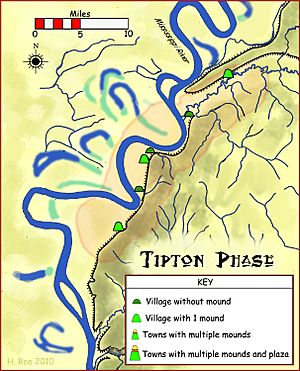
For a very long time, starting around 10,000 years before Christ, early people lived in this area. These were Paleo-Indians and later Archaic-Indians. They lived by hunting animals and gathering plants.
Later, from about 800 to 1600 AD, the Mississippi Delta was home to the Mississippian culture. These Native American people built large mounds of earth. Their biggest center was Cahokia, which is now in Illinois.
The Tipton phase people were a group of the Mississippian culture. They lived in the Tipton County area when Europeans first arrived. This was when the Spanish explorer Hernando de Soto came. Later, the Chickasaw tribe claimed and lived on this land.
Around 1800, European settlers began moving into the Chickasaw lands. The Chickasaw land in what is now West Tennessee was bought by the U.S. government. This was called the Jackson Purchase. Both Tennessee and Kentucky grew a lot because of this. In 1818, the Chickasaw and the U.S. signed the Treaty of Tuscaloosa. The Chickasaw were supposed to get payments for 15 years. However, the U.S. government was often late or gave them low-quality goods instead of money.
Big Earthquakes of 1811 and 1812
Huge 1811–12 New Madrid earthquakes happened in 1811 and 1812. These earthquakes changed the land a lot. They even changed the path of the Mississippi River. Because of this, a part of what is now Tipton County was cut off from Tennessee. The river's new path put the town of Reverie, Tennessee on the Arkansas side. Most of Tipton County is still on the Tennessee side of the river.
How Tipton County Was Formed
American settlers came to Tipton County because of its rich soil. They started cotton farms. They brought or bought African Americans who were forced to work as enslaved people on these farms. There were also many records of Irish people who worked as indentured servants. This area was famous for growing cotton.
Tipton County was officially created on October 29, 1823. It was made from parts of Shelby County. This land used to belong to the Chickasaw people. The county was named after Jacob Tipton (1765–1791). He was a soldier who died fighting Native Americans in 1791.
Life in the 1800s
In the early 1800s, steamboats were very important for trade on the Mississippi River. Randolph, one of the first towns in Tipton County, was a major shipping spot in Tennessee around 1830. It was even a competitor to Memphis for a while. But over time, its importance faded.
Trains slowly took over from riverboats for shipping goods. The first train service in Tipton County started in December 1855. This line connected Memphis to Nashville and went through Mason.
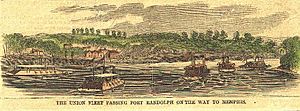
During the American Civil War, two forts were built near Randolph. These were Fort Randolph and Fort Wright. They were important because of their location on the Mississippi River. After the Civil War, new improvements were made. A train line to Covington was finished in 1873. A telegraph line, which sent messages over wires, opened between Memphis and Covington in 1882.
Covington got electricity in 1894. Water pipes were installed in 1898 to bring water to homes. In 1922, streets in Covington started to be paved. Since 1929, people in Covington have had natural gas. In the South Main Historic District in Covington, you can still see about 50 old homes from the late 1800s and early 1900s. This area is listed on the National Register of Historic Places.
Geography of Tipton County
The U.S. Census Bureau says Tipton County covers about 473 square miles. About 458 square miles are land, and 15 square miles (3.2%) are water. The main road that goes north and south, U.S. Highway 51, cuts through Tipton County and goes through Covington.
The western edge of Tipton County is the Mississippi River. This river separates Tennessee from Arkansas. As mentioned, the 1812 New Madrid earthquake changed the river's path in some places. Because of this, the official border still follows the old river path. So, some towns in Tipton County, like Reverie and Corona, are actually on the Arkansas side of the river. Tipton County is also near the New Madrid Seismic Zone. This is an area where there is a high risk of earthquakes.
Neighboring Counties
- Lauderdale County (north)
- Haywood County (east)
- Fayette County (southeast)
- Shelby County (south)
- Crittenden County, Arkansas (southwest)
- Mississippi County, Arkansas (northwest)
Population Information
| Historical population | |||
|---|---|---|---|
| Census | Pop. | %± | |
| 1830 | 5,317 | — | |
| 1840 | 6,800 | 27.9% | |
| 1850 | 8,887 | 30.7% | |
| 1860 | 10,705 | 20.5% | |
| 1870 | 14,884 | 39.0% | |
| 1880 | 21,033 | 41.3% | |
| 1890 | 24,271 | 15.4% | |
| 1900 | 29,273 | 20.6% | |
| 1910 | 29,459 | 0.6% | |
| 1920 | 30,258 | 2.7% | |
| 1930 | 27,498 | −9.1% | |
| 1940 | 28,036 | 2.0% | |
| 1950 | 29,782 | 6.2% | |
| 1960 | 28,564 | −4.1% | |
| 1970 | 28,001 | −2.0% | |
| 1980 | 32,930 | 17.6% | |
| 1990 | 37,568 | 14.1% | |
| 2000 | 51,271 | 36.5% | |
| 2010 | 61,081 | 19.1% | |
| 2020 | 60,970 | −0.2% | |
| U.S. Decennial Census 1790-1960 1900-1990 1990-2000 2010-2014 |
|||
2020 Census Details
| Race | Num. | Perc. |
|---|---|---|
| White (non-Hispanic) | 44,925 | 73.68% |
| Black or African American (non-Hispanic) | 10,760 | 17.65% |
| Native American | 180 | 0.3% |
| Asian | 393 | 0.64% |
| Pacific Islander | 39 | 0.06% |
| Other/Mixed | 2,987 | 4.9% |
| Hispanic or Latino | 1,686 | 2.77% |
In 2020, there were 60,970 people living in Tipton County. There were 21,452 households and 16,419 families.
2010 Census Details
In 2010, the county had 61,081 people. There were 21,617 households and 16,562 families. The population density was about 133 people per square mile. Most people (77.77%) were White. About 18.74% were Black or African American. People of Hispanic or Latino backgrounds made up 2.08% of the population.
Parks and Fun Places
Tipton County Museum
The Tipton County Museum is in Covington. It has many exhibits about Tipton County's history. You can see old items and learn about the area's past. There's also a nature center that shows the unique plants and animals of West Tennessee. You can see stuffed animals from the area and even pieces of mastodon bones.
Next to the museum is a 20-acre park. It has a half-mile walking trail. You can see natural woodlands and man-made wetlands. Smaller animals like turtles and birds live here. In front of the museum, there is a Veterans Memorial. It honors soldiers from the county who died in wars.
County Parks to Explore
Here are some of the parks in Tipton County:
Munford
- Centennial Park: Has a walking track, baseball/softball fields, picnic areas, and a covered playground.
- City Park: Features a gazebo, walking track, and playground.
- Poplar Park: Offers a football field, tennis courts, and a skate park.
- Valentine Park: Has playgrounds, soccer fields, a disc golf course, and a stocked lake.
- Hope Park: Includes a walking track and outdoor fitness equipment.
Atoka
- Adkison Park: Has a walking track, playground, and is home to Boy Scout Troop 60.
- Nancy Lane Park: Features an 18-hole disc golf course and softball fields.
- Pioneer Park: Has a fishing pond, fountain, and a walking track.
- Walker Park: Includes a splash pad, athletic field, and sand volleyball courts.
Covington
- Shelton Park: A 1-acre garden park with a gazebo and picnic tables.
- Patriot Park: Opened in 2004, it has an A-4 Skyhawk attack bomber as its main feature.
- Cobb Parr Memorial Park: A large playground where the Tipton County Bar-B-Q Festival is held.
- Frazier Park: A 10-acre park with a half-mile fitness trail, playgrounds, and ballfields.
Communities in Tipton County
Tipton County has 12 communities. Four of these are unincorporated communities, meaning they don't have their own local government.
Cities
Towns
Unincorporated Communities
See also
 In Spanish: Condado de Tipton (Tennessee) para niños
In Spanish: Condado de Tipton (Tennessee) para niños


